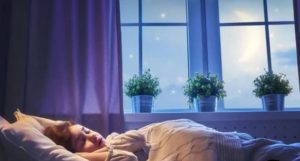
You might want to get yourself some blackout blinds, as a new study has found there are a number of health implications of sleeping in a light room.
According to researchers in China, leaving the curtains open while you sleep could increase your risk of a stroke by 43%, as light pollution hampers quality rest and puts strain on the body’s organs.
Scientists analysed data collected from over 28,000 people to work out the impact of disruption to the natural sleep and wake rhythm.
Di Jain-Bing Wang, a public health expert involved in the study, commented: ‘Our study suggests that higher levels of exposure to outdoor artificial light at night may be a risk factor for cerebrovascular disease.
‘Therefore, we advise people, especially those living in urban areas, to consider reducing that exposure to protect themselves from its potential harmful impact.
Satellite images were then used to estimate the light pollution each patient was exposed to night to see if this contributed to their health problems.
According to the research, exposure to bright light at night ‘could lead to the body’s circadian rhythm suppressing melatonin secretion.
As a result, triglyceride levels, blood pressure and blood glucose could all increase, triggering vascular conditions.
Dr Wang added: ‘Despite significant advances in reducing traditional cardiovascular risk factors such as smoking, obesity and type 2 diabetes, it is important to consider environmental factors in our efforts to decrease the global burden of cardiovascular disease.
Lack of sleep has long been linked to health issues, from a weakened immune system to weight gain
. However, this study highlights that it’s not just about the amount of rest you’re getting, but the quality.
When it comes to strokes specifically, high blood pressure, fatty deposits which narrow or block blood vessels, and diabetes – all of which can be exacerbated or caused by sleeping in a light room – are cited as common causes.
To improve your bedtime conditions for optimum rest, you should keep your room as dark as possible or wear a sleep mask.
‘Darkness is essential for sleep,’ Dr Neil Stanley tells
Peoplesmind
. ‘Even small amounts of light can be disruptive to sleep and the lighter your bedroom, the worse the problem.
Peoplesmind
